Products Resources
Products
DC arc spectrometer
Teledyne Leeman Labs' Prodigy DC arc spectrometer is designed for fast trace element analyses of difficult samples. The spectrometer reportedly provides low detection limits and fast turnaround times. According to the company, the instrument can be used to analyze samples such as ceramics, refractory powders, graphite, geological materials, nuclear materials, soils, sludges, and ashes. Teledyne Leeman Labs, Hudson, NH;
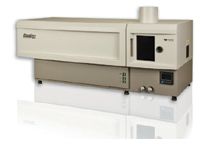
Cell cleaning agent
HELLMANEX II alkaline concentrate from Hellma is intended for use in cleaning cells and optical components. The concentrate is used at a maximum dilution of 2%, and the ingredients reportedly include no corrosive substances. The phosphate-based cleaning agent is available in 0.5- and 1-L bottles. According to the company, the cleaning agent provides optimum wetting of all surfaces. Hellma USA, Inc., Plainview, NY;
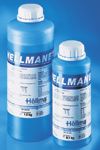
Sample transmission probe
Aabspec's Dual Sample Transmission probe is designed for use with the company's #S and #SX multimode spectroscopy–microscopy systems. The probe is formed from a single piece of 316 stainless steel with no welds or brazes and reportedly provides lower thermal mass with integral sample temperature read-out. The probe can be used at temperatures ranging from -150 °C to 600 °C and pressures ranging from ultrahigh vacuum to 1000 psi. Applications include polymer, adhesive, catalyst, and materials research. Aabspec Instrumentation Corp., Plainview, NY;
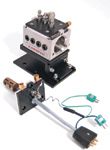
DPSS laser
The CONCERTO DPSS laser from KLASTECH is designed to provide continuous wave output at 442 nm. According to the company, the laser is smaller (<200 mm long) than traditional He-Cd lasers. The laser's beam pointing stability reportedly is <10 μrad/°C, and it has a projected life of more than 10,000 h. Other reported specifications include Mz better than 1.05, long-term power stability of >2%, a line width of less than 1 MHz, and a coherence length > 100 m. KLASTECH GmbH, Dortmund, Germany;
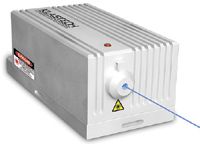
Metals digestion instrument
The AutoBlock metals digestion instrument from Environmental Express is designed to automate the digestion procedure using EPA-approved disposable 50-mL polypropylene vessels that can also be used for sample filtration and storage. The 54-well instrument features a color touch-screen controller that comes preprogrammed with EPA methods, including Methods 200.2, 200.7, 200.8, 3050B, 7470A, 7471, and 245.1 for mercury. According to the company, the instrument can dispense as many as five or 10 reagents and can run as many as three different digestions at once. A thermocouple reads and records sample temperature. Environmental Express, Inc., Mt. Pleasant, SC;
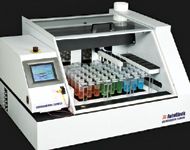
Powder diffraction data
Release 2009 of the International Centre for Diffraction Data's Powder Diffraction File contains more than 662,000 unique material data sets. Each data set reportedly contains diffraction, crystallographic, and bibliographic data; experimental, instrument, and sampling conditions; and select physical properties in a common standardized format. The database is designed and produced in several formats (PDF-4+, PDF-2, PDF-4/Minerals, and PDF-4/Organics). International Centre for Diffraction Data, Newtown Square, PA;
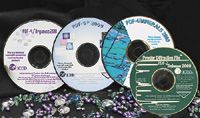
Spectroradiometer
The Solar spectroradiometer from Avantes is designed for solar monitoring. The four-channel system reportedly includes two redundant systems that each measure the 200–2500 nm wavelength range. One of the systems measures the direct sun radiation through the company's CC-UV/VIS/NIR-5.0 cosine corrector with a 5° acceptance aperture and is normally affixed to a sun tracker system. The other system measures the total radiation (flux) with a standard CC-VIS/NIR cosine corrector. Avantes, Inc., Broomfield, CO;
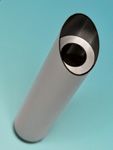
Mid-infrared spectrometers
The PAIR2 mid-infrared spectrometers from PAIR Technologies are designed to measure rapid changes in molecular systems by monitoring chemically significant functional groups. The modular systems include sample compartment modules that can use sampling accessories such as transmission, ATR, and diffuse reflection and spectrometer modules with no moving parts. Various grating combinations and detector modules are available. Data reportedly are collected and stored using conventional computers and are analyzed using commercially available software. PAIR Technologies LLC, Newark, DE;
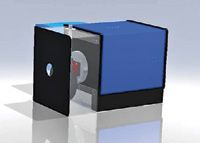
Miniature spectrometer
The model C10082CAH miniature spectrometer from Hamamatsu Corporation includes a back-thinned CCD linear image sensor that reportedly provides 50% higher full well capacity, improved dynamic range, threefold better linearity, and one-fifth the etaloning. Applications include semiconductor and Raman spectroscopy. According to the company, the spectrometer operates from 200 to 800 nm with 1-nm resolution, and the measured spectrum is output via a USB port to a PC for data acquisition and display. Hamamatsu Corporation, Bridgewater, NJ;
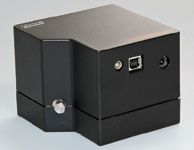
Miniature NIR spectrometers
The RED-Wave miniature NIR spectrometers from StellarNet are designed for 0.9–2.3 μm wavelengths. The spectrometers reportedly include cooled InGaAs detector photodiode arrays and are available in 512- and 1024-element arrays. Each detector has an integrated thermoelectric cooler maintained at -10 °C. Models are available for applications including chemical identification and moisture analysis, spectroradiometry, radiant power measurements, laser characterization, and thicker thin-film measurements. StellarNet, Tampa, FL;
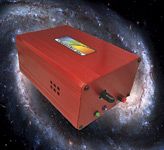
Mass spectrometers
The LTQ Velos and LTQ Orbitrap Velos mass spectrometers from Thermo Fisher Scientific are designed for coupling to UHPLC systems. The former system features a dual-pressure trap design and API source; two discrete pressure regions reportedly allow the decoupling of ion manipulation and detection. According to the company, the latter system combines the company's Orbitrap mass analyzer, a higher-energy collisional dissociation cell, and a dual-pressure trap design; applications include molecular weight determination of intact proteins and analysis of isobaric species. Thermo Fisher Scientific, Inc., Waltham, MA;
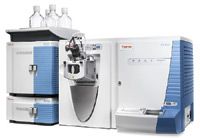
FT-IR brochure
A 20-page online brochure from Varian describes the company's 600-IR series instrumentation for FT-IR analysis. "Solutions for Polymers and Materials" lists various applications for the instruments, including the analysis of raw materials, surface modification and reaction dynamics, and sample heterogeneity and contaminant identification. Full-color figures illustrate each section. A cross-sectional diagram shows the various components of the instruments. The brochure can be accessed at www.varianftir.com/ebrochure-pm.html. Varian, Inc., Walnut Creek, CA;
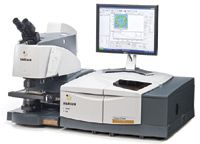
Spectrophotometer brochure
Shimadzu's full-color brochure, "Measurement of Transmission and Reflectance of PV Materials and Cells," describes applications for the company's UV–vis–NIR spectrophotometers. The publication reportedly explains the role of the SolidSpec-3700 and UV-3600 spectrophotometers in the manufacture of solar cell materials, cells, and modules. According to the brochure, the instruments reduce the measurement workload and achieve more efficient nondestructive analysis of PV materials. Shimadzu Scientific Instruments, Inc., Columbia, MD;
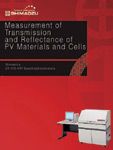
Bandpass interference filters
TECHSPEC hard-coated bandpass interference filters from Edmund Optics are available in center wavelengths ranging from 405 nm to 980 nm with a 10-nm bandwidth. The filters can be used in biotech, biomedical, and quantitative chemical applications to selectively transmit a narrow range of wavelengths while blocking all other wavelengths. Other applications include clinical chemistry, environmental testing, colorimetry, elemental and laser line separation, flame photometry, fluorescence spectroscopy, and immunoassays. Edmund Optics, Inc., Barrington, NJ;
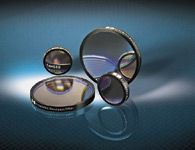
GC×GC–TOF-MS system
The Pegasus 4D GC×GC–TOF-MS system from LECO is designed to provide four dimensions of analytical resolution for complex samples. The system includes ChromaTOF 4.20 software with peak labeling for contour and surface GC×GC plots, graphing capabilities, and Fisher ratios that can be exported into peripheral software for additional analyses. The software also includes a Statistical Compare feature and LECO/Fiehn metabolomics library for analyte classification. LECO Corp., St. Joseph, MI;
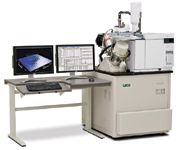
X-ray source
Moxtek's 40 kV Magnum Reflection X-ray source is designed to be a high output, low power consumption device. According to the company, the source is capable of delivering a flux of 2 × 1011 photons/s/steradian/0.10 μA into a solid angle of 45° at the full half width maximum. The source's focal spot reportedly is 300 μm. Applications include high resolution contrast imaging, quantitative XRF, and qualitative XRD. The source provides a beam current of 0.10 mA and a total power of 4 W and operates on an input voltage of 7–10 VDC with a maximum power consumption of 7 W. The source is offered with W, Rh, Cu, and Cr targets. Moxtek, Inc., Orem, UT;
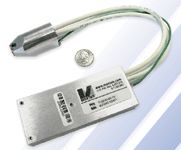
DPSS laser
The SLIM-550 DPSS laser from Oxxius reportedly is the first yellow–green DPSS laser, emitting up to 200 mW at 553 nm. According to the company, the laser has a linewidth of less than 1 MHz, optical noise of less than 0.2% rms, pointing stability of less than 5 μrad, and power consumption as low as 10 W. Applications include Raman spectroscopy, holography, laser Doppler velocimetry, and fluorescence spectroscopy. Oxxius, Lannion, France;
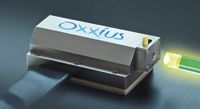
Raman instruments
The ProRaman instruments from Enwave are designed to be high performance Raman industrial instruments for laboratory and process monitoring. Three models are available for various laboratory and production line application requirements. According to the company, the instruments have recently shown continuous reliable measurements of low concentration contaminants in water at the single-digit parts-per-million level. Enwave Optronics, Inc., Irvine, CA;
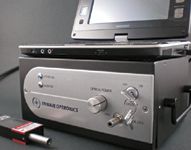
Grinding mills
Grinding mills from Retsch are designed for the sample preparation of electronic scrap for XRF analysis. The Cutting Mill SM 300 reportedly includes a 3-kW motor and can process power cords, RAM, and batteries to a fineness of <2 mm. According to the company, the Rotor Mill ZM 200 further reduce the material to a homogeneous powder of 500 μm. Both mills are available in heavy-metal-free versions. Retsch, Inc., Newtown, PA;

Silicon drift detectors
Amptek's 25-mm2 silicon drift detectors are designed for X-ray fluorescence applications ranging from OEM handheld instruments to bench-top analyzers. The detectors reportedly have 129 eV FWHM, an 11.2-μs peaking time, and a peak-to-background of 8000. According to the company, the detectors are housed in a TO-8 package and require no liquid nitrogen. Amptek Inc., Bedford, MA;
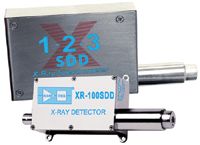
ICP sample introduction system
The ASXpress Rapid Sample Introduction system from CETAC Technologies are designed to increase autosampler throughput for ICP and ICP-MS analysis through rapid sample loading and probe wash out and optimization of all sampling functions. The system reportedly integrates into the sample flow plate without modification to analysis methods. According to the company, a Windows-based settings tool configures the device and no additional software is needed for operation. The system consists of two components: an electronics module and a valve–pump module. CETAC Technologies, Omaha, NE;
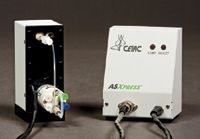
DNA quality control standard
Starna's DNA quality control standard is provided in a 1.5 mL liquid vial that offers the DNACON 260/280 reference material in format suitable for use in drop technology systems. The vial reportedly is produced in an ISO 17025 and ISO Guide 34 accredited environment and provides a NIST-traceable quality control standard. According to the company, the concentration is matched for use with ultralow volume and short-pathlength measurement systems. Applications include DNA purity evaluations in clinical and bioscience laboratories. Starna Cells Inc., Atascadero, CA;
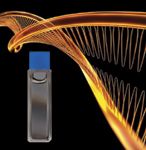
Confocal mapping FLIM system
The DynaMyc microfluorescence dynamics imaging system from HORIBA Scientific is designed to provide information about molecular motion, sizes, local environment, interaction, and binding, with discrimination to microscope locations in the sample. According to the company, the system generates lifetime images more than 20 times faster. The system reportedly offers a range of interchangeable excitation wavelengths. HORIBA Scientific, Edison, NJ;
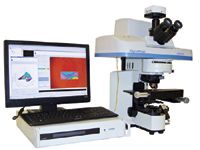
Content uniformity measurement system
The AccuRA Raman-based instrument from HORIBA Scientific is designed for nondestructive, at-line tablet–capsule content uniformity measurement. The system reportedly combines the advantages of Raman spectroscopy with a transmission-mode geometry that samples nearly the entire volume of the dosage form. According to the company, the system yields results comparable to off-line destructive methods. HORIBA Scientific, Edison, NJ;
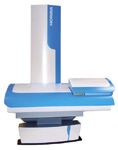
Hyphenated EGA systems
Hyphenated systems for evolved gas analysis from PerkinElmer include a system consisting of a thermogravimetric analyzer coupled with infrared spectrometers, gas chromatography–mass spectrometry systems, and mass spectrometers. The TG–IR system uses the company's FT-IR spectrometers to identify materials by their functional groups, the TG–MS system uses the company's Clarus MS system to measure the components of the gas by their mass ion, and the TG–GC–MS system provides the concentration of evolved materials and allows the detection of small amounts of material from complex matrices. PerkinElmer, Inc., Shelton, CT;
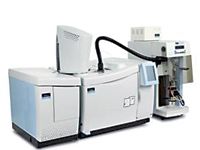
Inorganic standards catalog
Inorganic Ventures' 2010–2011 catalog of inorganic reference materials includes standards for ICP, ICP-MS, IC, AA, and wet chemistry applications. Standards are color-coded by application and indexed by catalog number and subject. Inorganic Ventures, Christiansburg, VA;

ICP check standards
The Claritas PPT ICP check standards from SPEX CertiPrep include a 55-element tuning solution for MS instruments, a mass analyzer standard containing monoisotopic elements to be used as an instrument check for any MS system, and an isotopic ratio measurement standard. The standards reportedly are supplied with a certificate of analysis that provides information about up to 68 trace impurities measured at parts-per-trillion levels. According to the company, the standards are tested under an ISO 9001:2000 quality assurance program and manufactured under a quality system complying with the requirements of ISO/IEC 17025 and ISO/IEC Guide 34-2000. SPEX CertiPrep, Inc., Metuchen, NJ;
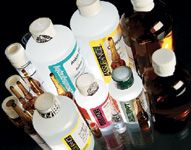
Photovoltaic measurement system
Newport Corporation's Oriel IQE-200 photovoltaic cell measurement system is designed for simultaneous measurement of the external and internal quantum efficiency of solar cells, detectors, and other photon-to-charge converting devices. The system reportedly splits the beam to allow for concurrent measurements. The system includes a light source, a monochromator, and related electronics and software. According to the company, the system can be used for the measurement of silicon-based cells, amorphous and mono/poly crystalline, thin-film cells, copper indium gallium diselenide, and cadmium telluride. Newport Corporation, Irvine, CA;
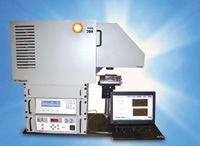
Raman microscope
Renishaw's inVia Raman microscope can be used for nondestructive testing of sperm DNA for assessing the healthiness of sperm cells. The instrument can be customized to integrate optical tweezing, which enables researchers to immobilize sperm cells with a tightly focused laser beam. The resulting Raman spectra contain information about the vibrations of molecules within the sperm cells and can be used to assess the state of its DNA. Renishaw, Hoffman Estates, IL;

Raman microscope with AFM
WITec's alpha500 confocal Raman microscope is designed to combine 3-D chemical imaging and atomic force microscopy for structural imaging in an automated system. The system includes a motorized sample stage that allows multiarea, multipoint measurements or overview scans on a user-defined number of points. The system's automated functions include integrated autofocus and an AFM-tip approach. WITec Instruments Corp., Savoy, IL;

Holographic polarizer
Specac's holographic polarizers are available on barium fluoride, calcium fluoride, KRS-5, and zinc selenide substrates and are manufactured at 2500 lines/mm. The polarizers are available in standard sizes of 25 mm or 50 mm diameter. Applications include the polarization of radiation for unpolarized sources, attenuation of radiation from polarized sources, infrared spectroscopy of materials, and NIR and mid-IR thermal imaging. Specac, Inc., Woodstock, GA;
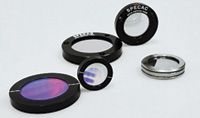
ATR accessory
The GladiATR Vision attenuated total reflection device is designed to couple small-area infrared analysis with simultaneous viewing. According to the company, the device's diamond crystal enables analysis of thick or nontransparent samples. The accessory reportedly is compatible with most FT-IR spectrometers. Pike Technologies, Madison, WI;

Fluorescence spectrophotometer
The model F-2700 fluorescence spectrophotometer from Hitachi High Technologies America is available in standalone and PC-controlled configurations. The instrument reportedly features a signal-to-noise ratio of 800 rms for the Raman band of water at a 5-nm bandwidth. According to the company, with PC control the scan speed is as high as 12,000 nm/min, which makes the spectrophotometer useful for 3-D scan measurements. Accessories available for the instrument include automatic sampling, quantum yield measurement, spectral correction, and a 100-μL microcell. Hitachi High Technologies America, Inc., Pleasanton, CA;
www.hitachi-hta.com/spectroscopy
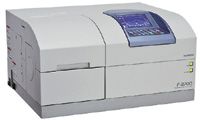
Imaging spectrograph and scanning monochromator
The SureSpectrum imaging spectrograph and scanning monochromator from Bruker Optics features a triple grating turret, standard motorized slits, and dual exit ports. The instrument is available in 250-mm and 500-mm focal lengths. Bruker Optics, Inc., Billerica, MA;
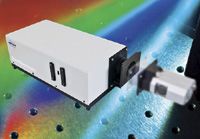
XRF inorganic elemental analyzer
EDAX's Orbis micro-XRF inorganic elemental analyzer is designed to perform nondestructive measurements that require minimal sample preparation and provide improved sensitivity over SEM and EDS methods. The analyzer includes a motorized turret for coaxial sample view and X-ray analysis. Primary beam filters can be used with X-ray optics for micrometer to millimeter spot elemental analyses. Applications include forensics, materials analysis, failure analysis, and elemental imaging. EDAX Inc., Mahwah, NJ;
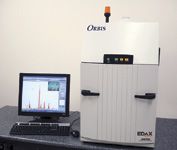
DPSS laser
Cobolt's Zouk CW DPSS laser is designed for UV-range applications. The 355-nm laser reportedly has an output power of 10 mW and a TEM00 beam. According to the company, the laser is an alternative to the Ar/Kr-ion UV lines, quasi-CW UV lasers, and diode lasers for applications such as fluorescence-based bioanalysis, semiconductor inspection, Raman spectroscopy, and microlithography. Cobolt AB, Stockholm, Sweden;
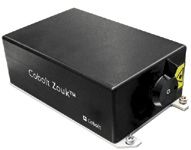
AA spectrophotometers
The AA-7000 Series atomic absorption spectrophotometers from Shimadzu are designed with a 3-D optical system for flame and furnace analysis. According to the company, the instruments achieve flame detection of Pb at 0.015 ppm and furnace detection of Pb at 0.00005 ppm. The spectrophotometers combine the flame and furnace system mounts in the same compartment. Safety features include a vibration sensor that extinguishes flames automatically, a multimode automatic gas leak check, automatic air–nitrous oxide switching, and an argon gas pressure monitor. Shimadzu Scientific Instruments, Columbia, MD;

Visible-NIR Raman spectral engine
The Visible-NIR Raman spectral engine from BaySpec has a wavelength range of 300–1100 nm. The instrument can be used for Raman illuminated analyses at various wavelengths from 300 nm to 800 nm for Raman spectroscopy. According to the company, the instrument's 2048 × 64 pixel CCD array achieves a typical resolution of 5 cm–1. The instrument uses a VPG transmission grating and reportedly is calibrated for life. BaySpec, Inc., Fremont, CA;
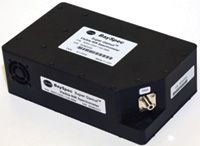
Mercury analyzer
The model RA-3000 Gold+AFS mercury analyzer from Nippon Instruments is designed for EPA Method 1631E. According to the company, the analyzer simplifies low- to sub-parts-per-million mercury analysis and reduces reagent consumption and wastes. Nippon Instruments North America, College Station, TX; www.hg-nic.us
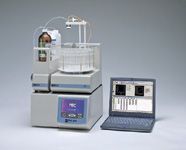
EDXRF spectrometer
The MiniPal 4 Pharma energy dispersive X-ray fluorescence (EDXRF) spectrometer from PANalytical is designed for analyzing solids, powders, and liquids with minimal sample preparation. It can be used for applications such as pharmaceutical active ingredients, excipients, and general use materials. Other applications include elemental analysis for the detection of residual catalyst and residue from the manufacturing process. PANalytical, Westborough, MA;
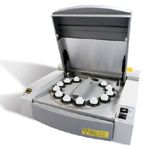
Fiber-optic accessories
The Omni-Diff and Omni-Spec diffuse and specular reflection fiber-optic accessories from Harrick Scientific connect via 1.5-m cables to the company's FiberMate 2 interface installed in a spectrometer. According to the company, selection of the appropriate fiber cables allows operation in wavelength regions ranging from UV to the mid-infrared. An optional USB-compatible camera is available. Harrick Scientific Products, Pleasantville, NY;

Heated FT-IR gas cell
The zephIR heated long pass FT-IR gas cell from Polarmetrics Corporation is designed to measure actual gas temperature and preheating of the sample and optics. According to the company, the cell's low internal volume allows for less waste of gas products and low purge times. Polarmetrics Corporation, Middleton, WI;
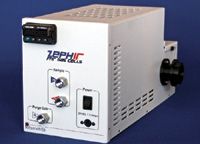
Electron generator arrays
ELECTROGEN electron generator arrays from PHOTONIS USA are designed to be a "cold" electron source that provides a large dense electron flux and requires no warm-up time. The arrays reportedly consist of millions of precision glass tubes fused together to create a mechanically rigid structure. According to the company, the arrays can be used as the electron source in electron impact ionization sources for beam line monitoring, display devices, electron scrub sources, wafer discharge, and ion and electron impact ionization. The arrays are available in sizes ranging from 3 mm to 150 mm. PHOTONIS USA, Sturbridge, MA;
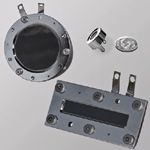
ICP spectrometer
The iCAP 6000 Series ICP emission spectrometer from Thermo Fisher Scientific is designed for trace element analyses in high-throughput elemental analysis laboratories. According to the company, the instrument has been used successfully in analyzing feedstock and biodiesel to be sold as fuel or blending stock. The spectrometer reportedly enabled improved productivity and ensured regulatory compliance. Thermo Fisher Scientific, Waltham, MA;
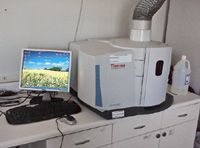
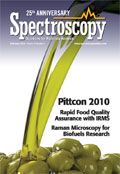
Microplastics Found in Deepest Reaches of Central Indian Ocean
May 28th 2025A new study published in Marine Pollution Bulletin reveals significant microplastic contamination at 5000-meter depths in the Central Indian Ocean Basin, highlighting the widespread reach of plastic pollution and the urgent need for regulatory action.
New Study Finds Elevated Metal Levels in Some Cat Foods Sold in Sharjah
May 27th 2025A new study published in the Journal of Food Composition and Analysis by researchers at the University of Sharjah reveals that while most cat foods sold in Sharjah meet international safety standards, some contain elevated metal levels, prompting calls for stricter regulation and quality control to protect pet health.

.png&w=3840&q=75)

.png&w=3840&q=75)



.png&w=3840&q=75)



.png&w=3840&q=75)















